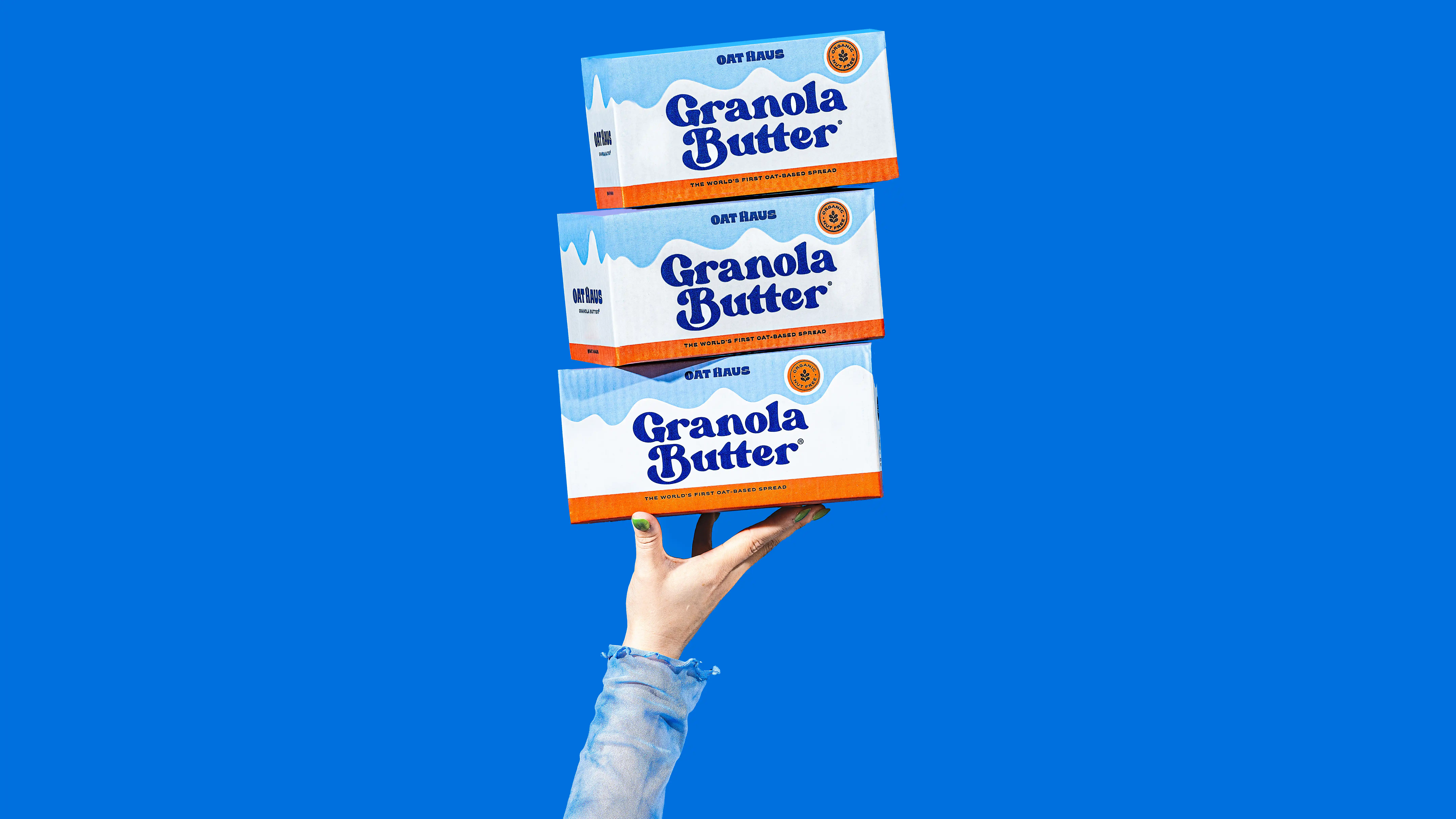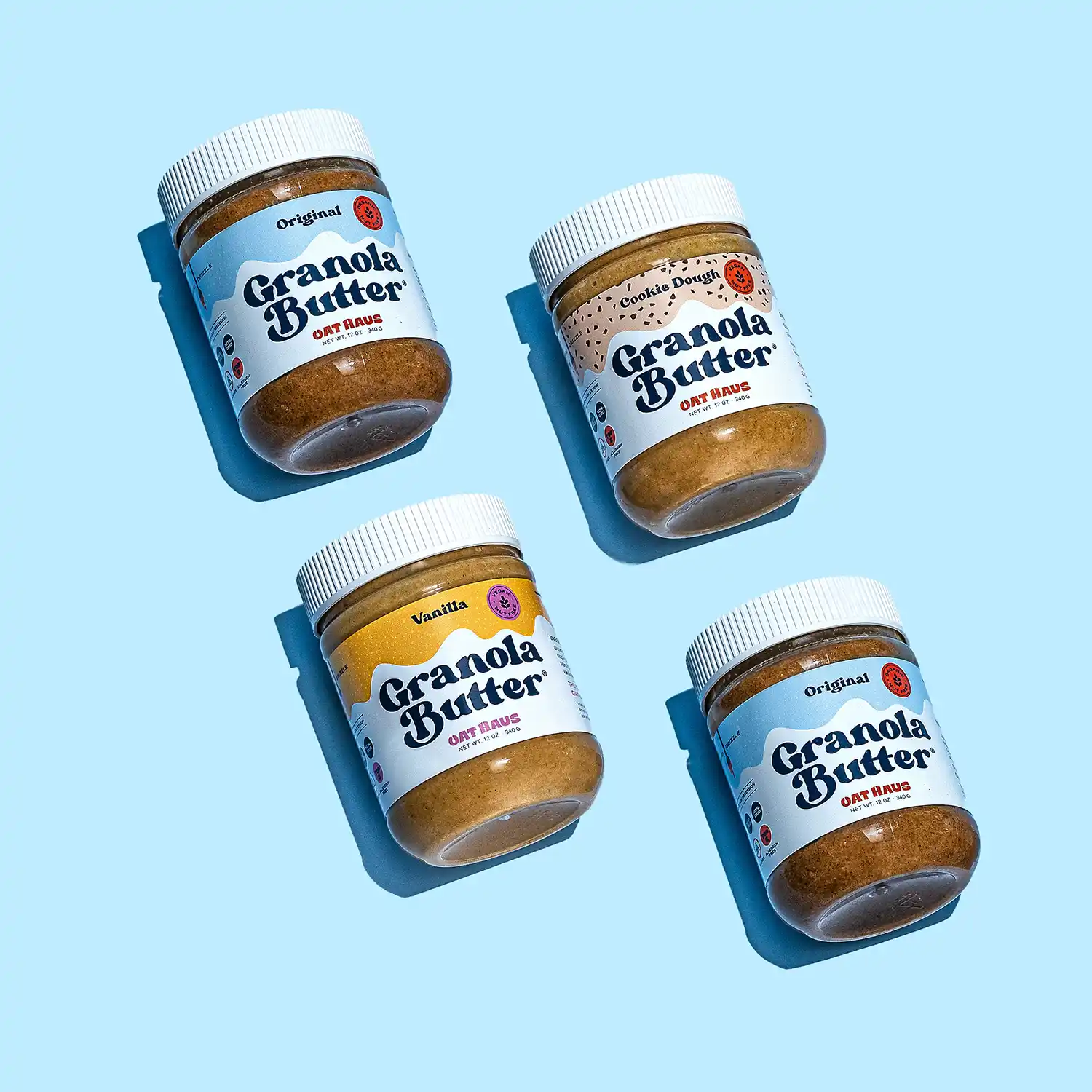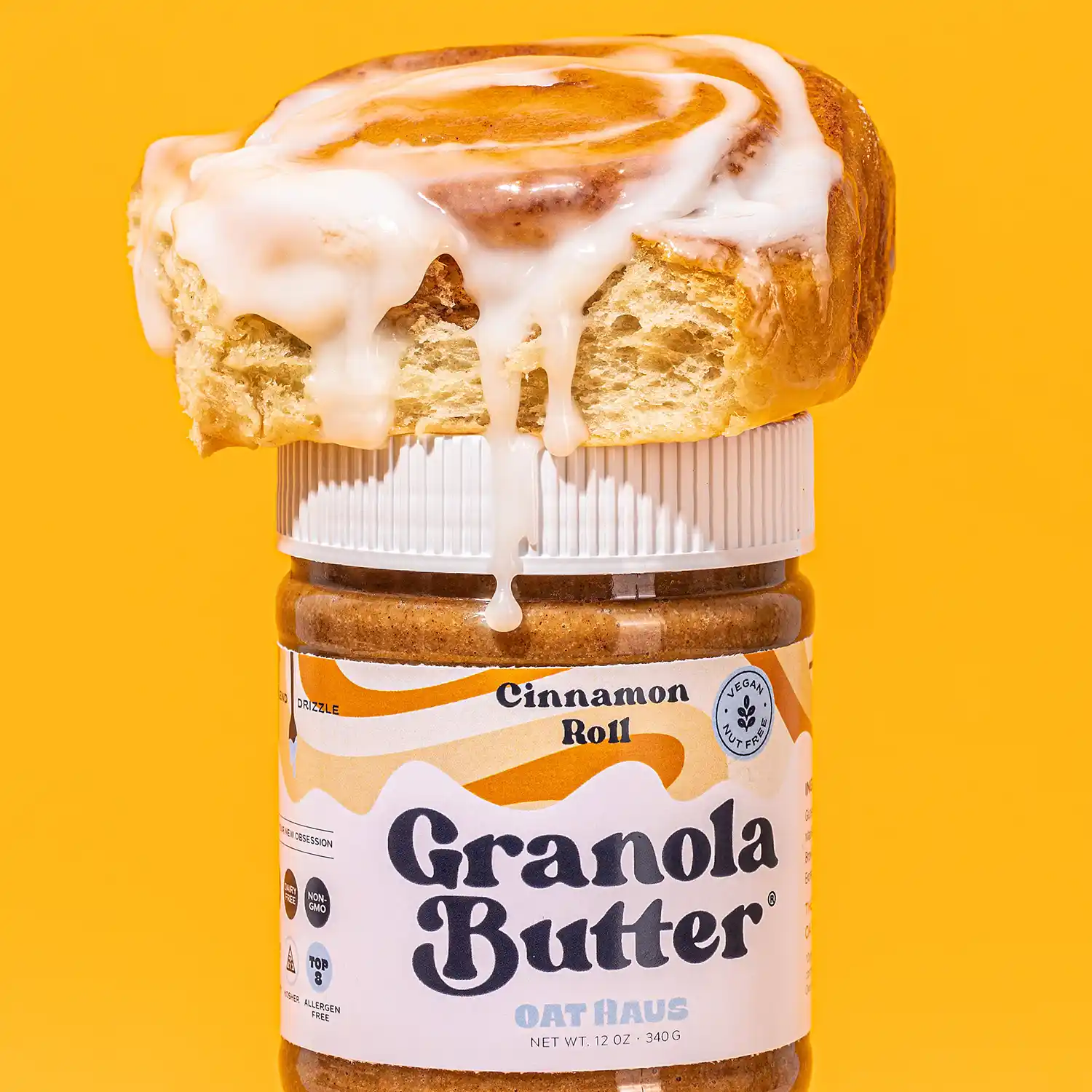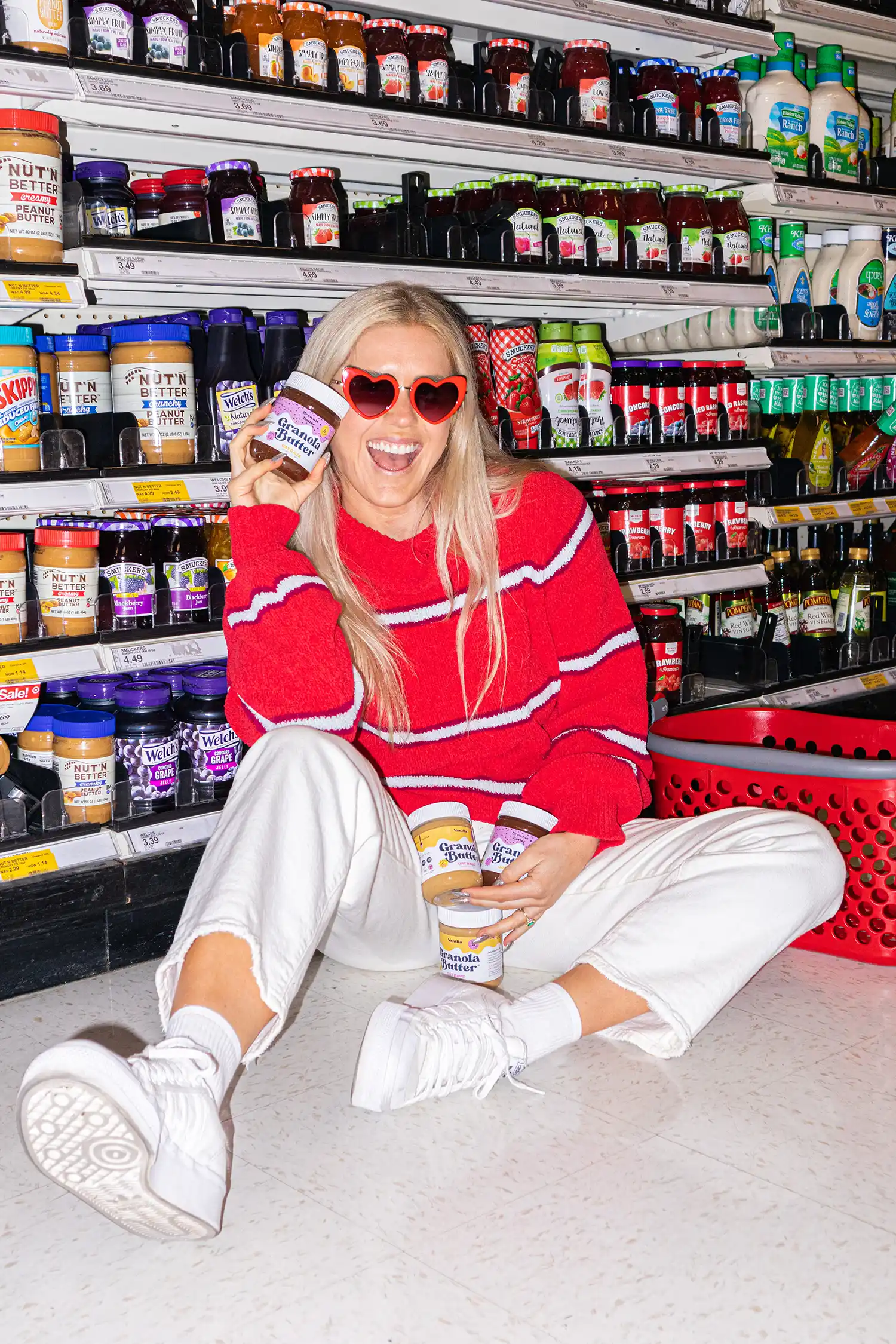From Recovery to Reinvention
For Ali Bonar, Oat Haus began not as a business plan but as part of her personal health journey. After recovering from an eating disorder, she was reintroducing foods she had long been eliminated from her diet, like peanuts and almond butter, only to find her body could not handle nuts. She recounts, “the nut-free spreads available, like sunflower or soy butter, were anything but appealing.”
At the same time, oat milk was exploding in popularity and reshaping dairy aisles. Ali had a simple thought: if you can make milk out of oats, why not a spread? She baked granola, blended it, and created something familiar yet completely new. That moment was the birth of granola butter, a product that would grow from her kitchen blender to Costco and Target shelves nationwide.

Hustle and the Grind of Validation
The early versions of Oat Haus were far from perfect. “One of my coworkers told me, ‘This tastes like wet sand. It’s a choking hazard,’” she remembered. Instead of discouraging her, those words fueled iteration after iteration. With her partner Eric and later their co-founder Ari, a chef they convinced over wine in Paris, Ali turned a personal experiment into the foundation of Oat Haus.
The team’s first year was anything but glamorous. They spent nights and weekends making granola butter by hand in a commissary kitchen, lining up rows of Vitamix blenders and stirring until their wrists ached. Pre-orders trickled in from Ali’s friends, family, and early supporters from her content. There was no viral launch and no overnight success.
What they did have was grit. Every scrap of feedback mattered. At first, the spread included collagen and flax, pitched as a functional alternative to nut butters. But customers did not buy it for protein. They bought it because it tasted good. Slowly, Oat Haus shifted toward indulgent flavors like birthday cake and brownie batter.
Even as Ali worked her day job in tech and Eric at Accenture, they poured nights, weekends, and paychecks into the brand. Oat Haus was not an escape from work. It was more work layered on top of everything else. But it was also alive, pulling them forward.

Storytelling as a Growth Engine
If the product was born out of Ali’s recovery, the brand was built on her willingness to share that recovery publicly. Years before “founder-led marketing” became a buzzword, Ali documented the highs and lows of building Oat Haus in real time. She showed herself crying after long production days, celebrated small wins, and responded to customer DMs personally.
This vulnerability created a bond with early adopters. Oat Haus was not faceless. It was a person with a story. “I never saw anyone talk about food struggles openly,” Ali said. “The reason I share is to help people feel less alone.”
Being visible brought criticism too. Strangers online left cruel comments and she recounts a story of this woman “who spit out her sample in front of her”. But she kept going. “We haven’t missed a day of posting in seven years,” she said. That relentless consistency built not just awareness but loyalty, transforming granola butter from a curiosity into a community.
%20copy.webp)
Breaking into Retail and the Road to Scale
In 2019, Oat Haus landed its first major account with Whole Foods. Ali did not have a broker or industry contacts, but she refused to let that stop her. “I literally just found the buyer on LinkedIn, guessed her email, and kept sending samples until I got a response,” she said. After months of persistence, she finally got the reply that changed everything: a test in 50 stores across Southern California, Arizona, and Hawaii.
Winning shelf space was only the beginning. For a year, Ali spent her days standing in stores, passing out samples to skeptical shoppers. “I did two back-to-back demos every single day for weeks, eight hours at a time, just begging people to try this thing they had never heard of,” she remembered. Some spit it out on the spot, but others loved it, and the velocity was strong enough for Whole Foods to expand them regionally and then nationally.
The expansion looked glamorous from the outside, but it demanded everything behind the scenes. “People think getting into retail means you’ve made it, but the truth is you need to support those doors, fill out endless paperwork, figure out logistics, and prove you can actually sell through,” Ali explained. Each new retailer meant bigger orders, higher standards, and a constant battle to manage cash flow.
When Costco finally came knocking, the company had to level up again. Shark Tank had put them on the radar, but Oat Haus was nowhere near ready the first time. “By the time they circled back, we had a facility, some automation, and a small team, but we still had to raise $400,000 just to cover ingredients and cash flow before we saw a single check,” Ali said. To handle the demand, they invested in filling machines and hired a night shift, growing their team to nearly 25.
The Costco launch was unlike anything before. Customers did not nitpick price the way they did at other stores. “At Whole Foods, people would taste it and say, ‘That’s good, but I don’t need it.’ At Costco, they’d try it and immediately say, ‘I’ll take three,’” Ali recalled. The volume was massive, but the real win was discovery: social media exploded with customers posting about finding Oat Haus in Costco, multiplying awareness in a way no other retailer had.
Looking back, Ali sees the grind of scaling as the real story. “Every step has forced us to evolve, from making jars in Vitamixes to running a full facility with automation,” she said. “The Costco launch was proof that granola butter wasn’t niche anymore. If it could sell there, it could sell anywhere.”
%20copy.webp)
The Long View
Oat Haus is no longer just the first oat-based spread. It is a category creator with national distribution, millions in sales, and a fiercely loyal community. But Ali remains honest that building it has never been easy. “It feels like pushing a business up a hill,” she said. “If you stop pushing, it rolls back down on you.”
Her advice to her younger self and to other founders is not about hacks or perfect strategies. It is about trust. “All of the answers are within you,” she said. “I’ve never regretted following my intuition, but I have regretted listening to advice that pulled me away from it.”
For Oat Haus, the vision now stretches beyond granola butter. With new product lines launching and retail expanding, the brand is set to keep reshaping the grocery aisle. But its essence remains the same as the first jar Ali blended in her kitchen, rooted in honesty, born from need, and powered by community.
Because Oat Haus is not just a spread. It is proof that there is no magic bullet in business, only persistence, discipline, and the determination to keep pushing when the work gets hard.
















